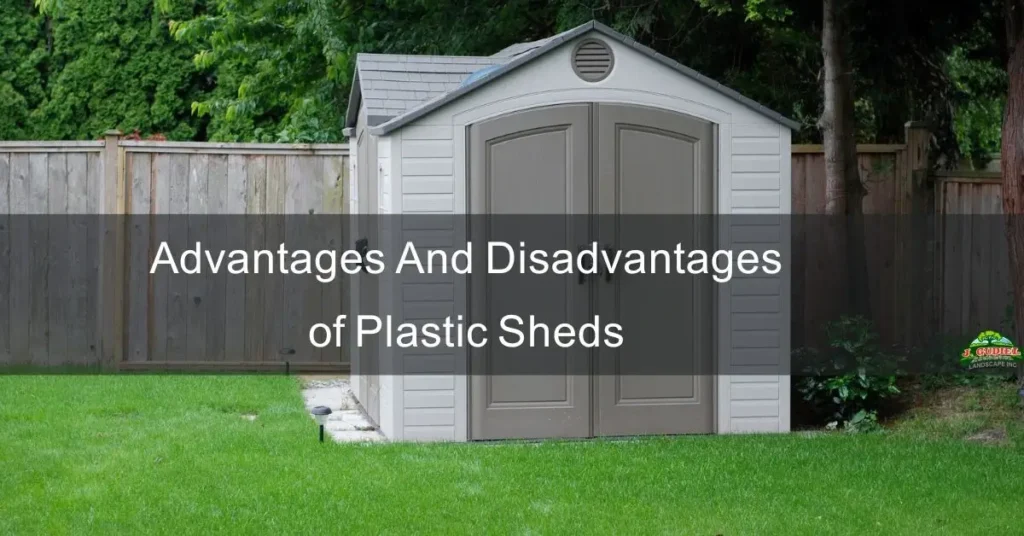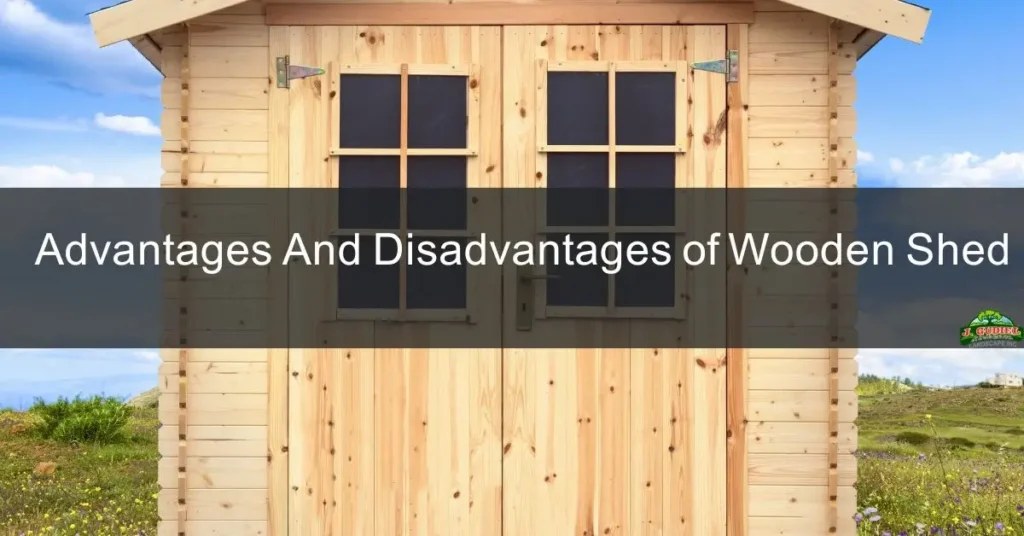When purchasing a shed, selecting the right material is important for having a great experience. Plast and wooden shed are the common shed materials, but which one is best so lets compare them: Plastic vs Wooden shed.
What Are Plastic Sheds and Wooden sheds?
Plastic sheds
Plastic sheds are durable outdoor storage structures that are usually made from vinyl (aka polyvinyl chloride). Plastic sheds are lightweight, low maintenance and most importantly they are cheap.
Wooden Shed
A wooden shed is a durable outdoor storage builds with wooden siding. There are many wood sidings to pick from, options include engineered wood siding, cedar siding, pine siding, spruce siding, and various other selections. Beside it, there is no lack of styles to choose from board and batten, panels, shingles, shake siding and board and batten.
Advantages And Disadvantages of Plastic Sheds

First let’s talk about their advantages and disadvantages.
Advantages
Advantages of plastic sheds are written below.
Low Maintenance
Plastic is very low maintenance material. This is because plastic don’t rust, and they are termite-proof. So, taking care of a plastic shed and cleaning then are way too easy.
Cost
If you are on budget plastic sheds are the perfect option for you. Plastic sheds are the cheapest sheds on the market begin at only few hundred dollars. They are usually small so you won’t need to buy a foundation.
Lightweight
Compared to wood or metal sheds, plastic sheds are lightweight, making them easier to transport and install. This can be particularly advantageous if you need to move the shed to a different location in your yard.
Weather- Proof
High-quality plastic sheds can withstand various weather conditions, including rain, snow, and sunlight, without deteriorating. They’re often designed to be UV-resistant, preventing fading and damage from sun exposure.
Disadvantages:
Disadvantages of plastic sheds are written below
Limited Aesthetic Appeal
Plastic sheds may lack the traditional look and feel of wood or the sleek appearance of metal sheds. Some people find their appearance less appealing or less complementary to their outdoor space.
Less Structural Strength
While plastic sheds are durable, they may not be as structurally strong as sheds made from other materials. This could potentially be a concern in areas prone to high winds or heavy snow loads.
Limited Customization Options
Plastic sheds typically come in pre-designed sizes and styles, offering limited customization options compared to wood or metal sheds. If you have specific requirements for size or design, a plastic shed may not be the best choice.
Environmental Impact
Many plastics used in shed construction are not biodegradable and can have a negative impact on the environment. While some manufacturers use recycled materials in their products, plastic sheds still contribute to plastic waste.
Potential for Damage
Although durable, plastic sheds can be susceptible to damage from extreme weather conditions, such as strong winds or hail. Additionally, they may be prone to cracking or warping over time, especially if exposed to fluctuating temperatures.
Advantages And Disadvantages of Wooden Shed

Advantages
Here are the advantages of wooden sheds
Aesthetic Appeal:
While Wooden sheds have a natural and timeless aesthetic that many people find appealing, they also blend well with outdoor living environments and can be easily customized with paint, stain, or decorative elements to match your preferences or the style of your home.
Sturdiness:
High-quality woodsheds, especially those made from durable hardwoods like cedar or redwood, can be quite sturdy and long-lasting. They provide a solid structure that can withstand various weather conditions when properly maintained.
Customization:
Wood is a highly versatile material, allowing for a wide range of customization options. You can easily modify the size, shape, and design of a wooden shed to fit your specific needs and preferences. Additionally, you can add features like windows, doors, shelves, and lofts with relative ease.
Insulation:
Wood naturally provides better insulation than materials like metal or plastic, helping to regulate temperature and humidity inside the shed. This can be advantageous if you plan to use the shed for storing temperature-sensitive items or as a workspace.
Environmental Sustainability:
Wood is a renewable and biodegradable material, making it a more environmentally friendly option compared to plastics or metals. Additionally, if sourced responsibly from sustainably managed forests, wooden sheds can have a lower carbon footprint.
Disadvantages
Here are the disadvantages of wooden sheds
Higher Maintenance
The Wooden sheds generally require more maintenance compared to sheds made from other materials. They need regular painting, staining, or sealing to protect against moisture, rot, and insect damage. Without proper maintenance, woodsheds can deteriorate over time.
Prone to Rot and Insect Damage
Wood is susceptible to rot, mold, and decay when exposed to moisture for extended periods. Additionally, wooden sheds can attract pests like termites, carpenter ants, and wood-boring beetles if not properly treated or maintained.
Higher Cost
Wooden sheds tend to be more expensive than sheds made from materials like plastic or metal, especially if constructed from high-quality, rot-resistant wood species. The initial cost of purchase and ongoing maintenance expenses should be considered when investing in a wooden shed.
Vulnerability to Weather
While wood is a durable material, it can be vulnerable to extreme weather conditions such as heavy rain, snow, and prolonged exposure to sunlight. Without adequate protection and maintenance, wooden sheds may warp, crack, or deteriorate over time.
Fire Hazard
Wood is combustible, making wooden sheds more susceptible to fire compared to sheds made from non-combustible materials like metal or plastic. Proper precautions, such as installing fire-resistant materials or keeping flammable items away from the shed, are necessary to minimize the risk of fire.
Plastic vs Wooden Shed
Comparing plastic and wooden sheds involves considering various factors, including durability, maintenance requirements, aesthetics, cost, and environmental impact. Here’s a comparison of plastic and wooden sheds based on these factors:
Durability
Plastic Sheds
Plastic sheds are generally durable and resistant to rot, rust, and corrosion. They can withstand various weather conditions, including rain, snow, and sunlight, without deteriorating. However, they may be prone to cracking or warping over time, especially if exposed to extreme temperatures.
Wooden Shed
High-quality wooden sheds, especially those made from rot-resistant wood species like cedar or redwood, can be quite durable. Properly maintained wooden sheds can last for many years. However, wood is susceptible to rot, mold, and insect damage if not adequately protected and maintained.
Maintenance Requirements
Plastic Sheds
Plastic sheds require minimal maintenance compared to wooden sheds, as they don’t need painting or staining. They don’t need to be painted, stained, or treated, and they’re easy to clean with soap and water. However, occasional cleaning and inspection for cracks or damage are recommended.
Wooden Sheds
The Wooden sheds require more maintenance than plastic sheds. They need to be regularly painted, stained, or sealed to protect against moisture, rot, and insect damage. Additionally, wooden sheds may need repairs or replacements for damaged wood components over time.
Aesthetics
Plastic Sheds
Their design is modern and utilitarian, making them a practical choice for many homeowners. While some people appreciate their sleek and clean look, others may find them less visually appealing compared to wooden sheds.
Wooden Sheds
Wooden sheds have a natural and timeless aesthetic that many people find attractive. They blend well with outdoor environments and can be customized with paint, stain, or decorative elements to match your preferences or the style of your home.
Cost
Plastic Sheds: In terms of affordability, they tend to be cheaper than wooden sheds, especially for budget-friendly options.. They offer a cost-effective storage solution without sacrificing durability and functionality.
Wooden Sheds: Wooden sheds are generally more expensive than plastic sheds, especially if constructed from high-quality, rot-resistant wood species. The initial cost of purchase and ongoing maintenance expenses should be considered when investing in a wooden shed.
Environmental Impact:
Plastic Sheds:
Plastic sheds are made from non-biodegradable materials, which can have a negative environmental impact. While some manufacturers use recycled materials in their products, plastic sheds still contribute to plastic waste.
Wooden Sheds:
Wooden sheds are made from a renewable and biodegradable material, making them a more environmentally friendly option compared to plastic sheds. Additionally, if sourced from sustainably managed forests, wooden sheds can have a lower carbon footprint.
Thats the end of Comparision of Plastic vs Wooden Shed, Before adding more storage, make sure to check the number of sheds allowed on your property to comply with local regulations.
Conclusion
The choice between a plastic vs wooden shed, boils down to priorities. Plastic sheds are low-maintenance and budget-friendly, yet may lack long-term durability and aesthetic appeal. Meanwhile, wooden sheds offer timeless charm and better insulation but require more upkeep and can be pricier. Ultimately, it’s about weighing the trade-offs between convenience and style to find the best fit for your needs and preferences. If you’re deciding between different storage options, check out Storage Shed vs. Storage Unit to find the best solution for your needs.
FAQs:
Q1: What are the maintenance requirements for plastic and wooden sheds?
A: Plastic sheds generally require less maintenance, often needing only occasional cleaning. Wooden sheds typically need more attention, including periodic staining or painting to protect against weathering and rot. For a detailed guide on keeping your shed in top condition, check out Shed Maintenance Tips to extend its lifespan.
Q2: How do plastic and wooden sheds differ in durability?
A: Plastic sheds are resistant to rot, insects, and moisture, offering a longer lifespan in many cases. Wooden sheds, while durable, may require more upkeep to prevent deterioration over time, especially in harsh weather conditions.
Q3: What about customization options for plastic and wooden sheds?
A: Wooden sheds offer more customization opportunities, allowing you to tailor the design, color, and features to match your preferences and outdoor aesthetic. Plastic sheds usually come prefabricated with limited customization options.
Q4: Which sheds offer better insulation?
A: Wooden sheds tend to provide better insulation, maintaining more consistent temperatures inside, which can be advantageous for storing temperature-sensitive items. Plastic sheds may experience more temperature fluctuations, depending on their design and material thickness.

